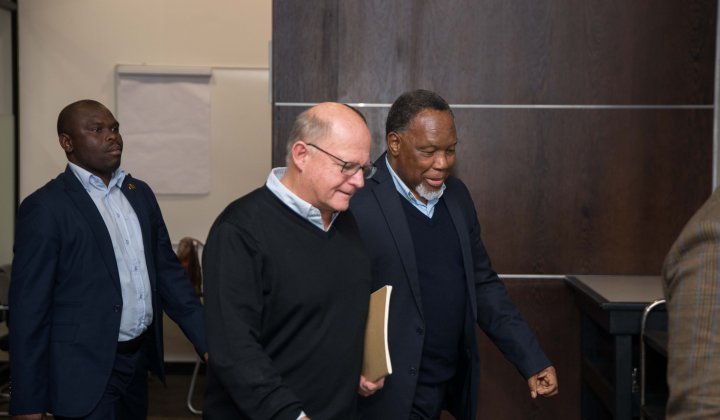Research papers
Designing for loyalty programme effectiveness in the financial services industry
Sonja Fourie, Michael Goldman & Michael McCall
Dr Sonja Fourie, chief commercial officer at Pinnacle Rewards, summarised the importance of the research by saying that the financial services sector is investing significantly in loyalty programmes. To maximise the benefit of rewards programmes, businesses require effective design, by considering the type of rewards they offer, including social and exploration benefits, as well as the timing of rewards.
KEY TAKEAWAYS
- Monetary rewards aren’t everything.
- Financial services customers saw more value in social benefits, such as belonging to a community and a brand that shares the same values.
- They also preferred exploration benefits, which provided access to new products and better financial decisions.
Practical business application
GIBS senior lecturer Michael Goldman says, “There is no silver bullet or one-size-fits-all when it comes to loyalty. Companies hoping to retain their best customers, and increase the share-of-wallet they receive from these customers, must understand which benefit types are most appealing to which segments.” Fourie explains further, “Loyalty programmes in the financial services industry have traditionally primarily focused on monetary benefits. Augmenting the benefit category design to include social and exploration benefits would vastly improve the effectiveness of these programmes. Also considering that the timing of rewards (immediate or delayed) influences the effectiveness of monetary and exploration rewards, effective designs need to accommodate these preferences.”
For the full paper go to: https://doi.org/10.1057/s41264-022-00158-9
Authentic leadership’s influence on strategic corporate social responsibility in South Africa: Mediated by participative decision-making
Bradley Nqumba & Professor Caren Scheepers
GIBS' Professor Caren Scheepers says that the study brings African theory to research on leadership in Africa. Bradley Nqumba, City of Johannesburg engineering manager, says that he found the meeting of the ideas of authentic leadership, strategic CSR, perception of sustainability, participative decision-making and Ubuntu interesting. He says, “The purpose of the research is important because it seeks to investigate the influence of a positive form of leadership, particularly authentic leadership, which could lead to organisational sustainability within an African context.” He added that the paper highlights how decision-making by the leaders was influenced, because from an Ubuntu perspective, inclusive decision-making is important and is part of humanness. It is informed by the connectedness to the community.
KEY TAKEAWAYS
- Challenges implementing Ubuntu decision-making in the corporate environment stem from often negative colonial sentiments.
- A participative decision-making environment within organisations ensures that employees are engaged, and CSR stakeholders are aware of decisions that are taken on their behalf.
- Organisations' effectiveness is achieved from the resulting increase in employee motivation.
- Employee participation improves employees’ perception that the organisation truly cares for them, which reinforces that the company also cares for external stakeholders.
- The approach will attract employees who want to work for authentic organisations. New generations are especially sensitive to authenticity.
Practical business application
Nqumba says that organisations need to set targets and goals to show commitment from management based on the sustainability core values. When management "walks the talk" by incentivising those who achieve these targets, employees will become increasingly motivated and their perception of the organisation will be improved and the stakeholders will, in turn, be happier, and more willing to invest in such mechanisms that build brand equity.
To read the paper, click here: https://doi.org/10.1108/EBR-05-2022-0095
The potential of crowdfunding to promote business in the context of an emerging economy
Alet Erasmus, Geoffrey Tocknell & Flip Schutte
Professor Alet Erasmus of the Department of Consumer Science at the University of Pretoria says, “This study examined crowdfunding as a viable financing model for South African businesses to pursue, relying on 'ordinary' people with an empathetic understanding of challenges faced in these trying times, to invest in initiatives that they consider worthy.” She added that despite crowdfunding having the potential to reduce the gaps between supply and demand economics, it is not being optimised to its full potential.
KEY TAKEAWAYS
- Four key streams of crowdfunding, in order of their attractiveness, are:
- stock shares/equity
- debt/loans
- rewards
- donation-based.
- Entrepreneurs perceived crowdfunding as a way to market their businesses, more so than as easy access to funding.
- Access to funding was a bigger concern for entrepreneurs than high interest rates.
- Potential investors’ strongest motivation to support crowdfunding initiatives is related to the transactional utility of a venture, specifically to serve “ecological and social issues”. In other words, investors are more willing to support endeavours with social and environmental underpinnings than to gain financially from their investments.
- Potential investors did not necessarily require evidence that a business is secure for them to invest.
- For entrepreneurs to optimise crowdfunding they have to be better acquainted with funding models.
- Less than 1% of local entrepreneurs have made use of crowdfunding.
- Roughly 33% of respondents are willing to use crowdfunding in the future.
Practical business application
Erasmus says, “The study concluded that knowledge about crowdfunding significantly influences potential investors’ willingness to participate in crowdfunding initiatives, highlighting the need to educate the broader population and business about crowdfunding as a phenomenon, the different crowdfunding models, and how this type of funding could be used to secure the future of small businesses and grow the economy.”
To read this paper, click here: https://doi.org/10.1057/s41264-022-00165-w
Luxury ethical consumers: Who are they?
Joëlle Vanhamme, Adam Lindgreen & Gülen Sarial-Abi
Consumers of luxury goods used to put prestige before ethical responsibilities. New consumers, such as Millennials and Generation Z, may be about to change that. Professor Adam Lindgreen from the Copenhagen Business School says, “We see that many luxury companies, therefore, are adopting a sustainable approach, both environmentally and socially. Brands have had to accept that modern-day luxury has its responsibilities to the environment and to the wider community.”
KEY TAKEAWAYS
- 30% to 40% of luxury consumers seek ethical luxury and view ethics as an important purchase determinant.
- Millennials and Generation Z consumers are driving 85% of global luxury sales growth, and aligning luxury purchases with their values is important
- There are five categories of luxury ethical consumer personas: of differing age, ethics, human values, purchasing motivation and assumptions about the world.
- Luxury companies need to position different strategies for products and services in their portfolios and consider different models to serve each group.
Practical business application
To succeed in a new world, luxury businesses' strategies need to adapt. “The longer-term, sustainable strategy for the luxury sector could be to replace non-ethical luxury purchases with ethical versions, without increasing the total number of purchases, potentially through a long-term, corporate strategy of continuing education and campaigning, activism on ethical issues, as well as adaptions of alternative business models that are more sustainable,” says Lindgreen.
For this paper, go to: https://doi.org/10.1007/s10551-021-04981-3
Explaining the performance of South African firms
Robert Grosse, Albert Wöcke & Morris Mthombeni
The research looks at competitive strategy, which has turned to explore the differences between emerging market (EM) companies and traditional companies from the US, Europe and Japan. The research questions whether we need a new theory of EM companies, or can existing theory be applied, but with adaptations?
KEY TAKEAWAYS
- Factors that contribute to performance include company size, brand value, company age, international sales and family ownership.
- The literature that has developed on EM companies competing internationally fails to recognise that most of the features identified exist for all companies in a given country – so they do not explain domestic (South African) performance.
- Of course, even in the domestic context, some companies will be better able to take advantage of institutional capabilities such as dealing with the government and with volatile economic conditions than other companies.
Practical business application
For EM companies to succeed in their domestic markets they should look to build size/scale, develop their brands and expand internationally. They should also expand ownership to non-family investors. These factors were significantly correlated with superior performance of listed companies in South Africa and have been shown to apply elsewhere as well.
To read this paper, click here: https://doi.org/10.1108/IJOEM-05-2021-0809
*Award-winning*
Exploring the process of transformative learning in executive coaching
Gloria Mbokota, Kerrin Myres & Sunny Stout-Rostron
This paper explored transformative learning in executive coaching, in an uncertain world, through the lens of the coachee. GIBS lecturer Gloria Mbokota says, “When we find ourselves not being able to use our past experiences and knowledge to make sense of the current VUCA (volatile, uncertain, complex, ambiguous) reality, we often go into state of disorientation/confusion/inner conflict.” While this may be a negative experience, it opens an opportunity for leaders to interrogate their own values, beliefs and assumptions about these circumstances and their responses to them.
KEY TAKEAWAYS
Transformative learning occurs in three phases during the coaching process.
- Phase of dissonance, where disorientation may be expressed in emotions of fear, frustration and anxiety as we try to make sense of what is going on around us.
- Phase of uncertainty, where we experience self-doubt as we do not have the skills to deal with our new situation. We experience denial, defensiveness and resistance; we need to resolve our inner conflicts.
- Phase of exploration, we reach a state of acceptance and explore new, creative and innovative ways of dealing with undesirable situations, and face an uncertain future with more confidence.
Practical business application
Mbokota says, “HRD practitioners can no longer afford to simply focus on knowledge and skills transfer; they need to ensure that executives and employees alike think critically and shift their meaning perspectives, enabling them to respond with agility to unforeseen external stimuli and complex internal dynamics, and to adapt organisational processes accordingly.” The use of transformative learning helps executives and employees deal with the disorienting dilemmas faced in an uncertain world. She concludes: “We have demonstrated executive coaching is an excellent vehicle for facilitating this process.”
To read this paper, click here: https://doi.org/10.1177/15234223221079026
Book chapter
Funding entrepreneurs within business groups: An emerging market view
in the De Gruyter Handbook of Entrepreneurial Finance
Jonathan Marks & Aleia Bucci
Entrepreneur and researcher Dr Aleia Bucci and GIBS' Professor Jonathan Marks noted about their research, “Business groups are a common feature of the economic landscape in emerging markets, particularly where there are poor institutions. This chapter explores how financing decisions are made in the sub-Saharan African context.”
KEY TAKEAWAYS
- In emerging markets, business groups hold a prominent position in the economic landscape.
- In Africa, these groups rely on family, networks and social capital to increase entrepreneurial activity.
- Business groups provide access to efficient internal capital, reduce costs of external capital, enhance credibility, amass local entrepreneurial experience and offer access to influential networks.
- The dominant market position of business groups may also have negative consequences, including creating barriers to entry for independent entrepreneurs and stifling innovation in the region.
Practical business application
The authors noted, “Entrepreneurs face significant challenges in scaling their businesses in emerging markets. However, those affiliated with business groups can utilise the networks, resources and expertise offered by these groups to overcome the complexities and weak institutional frameworks needed for growth. By operating within the structure of a business group, entrepreneurs may achieve higher levels of growth than those who operate independently.”
To read this chapter, click here: https://doi.org/10.1515/9783110726312-009
Case study
Mungo Mill South Africa: Leading a sustainability strategy during Covid-19
Professor Caren Scheepers, Maxine Jaffet & Candace Dick
Mungo Mills is a South African artisanal business retailing homeware textiles, which scaled from being a community-based business into an international brand.
GIBS lecturer and consultant coach Maxine Jaffit explains, “The research is interesting from multiple perspectives. It is a contemporary issue that brings to the fore decision-making challenges within dynamics of complexity, contextual realities and strong values systems. Secondly, it asks us to think about the challenges of scaling up a business and more specifically scaling up an artisanal business that has sustainability as its core identity. Finally, it explores leadership and the dilemmas leaders face.”
She adds that the research also invites students to question strategies for internationalisation, strategies for transitioning to online technologically enabled businesses and the ability to deal with trade-offs and dilemmas.
KEY CONSIDERATIONS
- How to preserve and protect a cultural paradigm and belief system while growing a business
- Strategic tools to enable exploration of growth possibilities
- The power of entrepreneurial vision and purpose
- The ability to come together in a time of crisis, utilising core skills and capabilities, while demonstrating resilience
Practical business application
In times of crisis, like the pandemic, businesses need to pivot using their core capabilities. GIBS MBA graduate and consultant Candace Dick says that the study "showcases the potential for businesses with a unique offering and cultural identity to run an international business from a small town in South Africa, despite the economic realities, by adopting an online business model. It offers considerations around succession planning for family-owned community businesses.”





